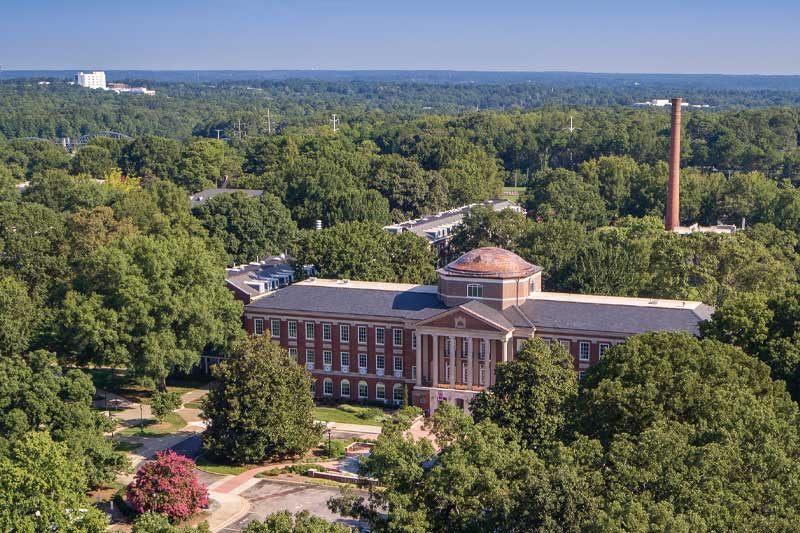Meredith Student Teachers Commended for Leadership in the Shift to Virtual Learning
- By Cailyn Whitman
- Published

In today’s technologically advanced world, educators are perhaps more prepared than ever before for virtual learning. But in the face of a global pandemic, the sudden transition to remote instruction in spring 2020 presented a unique set of challenges for everyone in the education field – including student teachers.
Professor of Education Monica McKinney said the switch came at a time when Meredith student teachers were just starting to build their confidence in the classroom.
“They were in the midst of gaining their rhythm with presenting content, honing their classroom management skills, and working as peers with their grade-level teams,” said McKinney. “Then, they had to do a complete pivot and deliver instruction online instead of in person.”
Donna Kocur, field experiences coordinator for the education program, said the main challenge for the student teachers was managing the many emotions that came with the switch to remote learning. “Our students are experts at building relationships with their cooperating teachers, students, and the school community. I heard from my students all the time how much they really missed their students – seeing them in the classroom, teaching them, hugging them, encouraging them, and sharing the joys of teaching and learning,” she said.
“The biggest challenge was not being able to see my kids face-to-face,” said Teaching Fellow Allie Manchester, ’20. “Remote learning made it impossible to gauge students’ understanding of a lesson before they turned their assignments in, and I was unable to give the critical mid-lesson feedback that students often need to be successful. It made it so difficult to assess where they were emotionally, too.”
Manchester, who graduated with a B.A. in psychology and teaching licensure for grades K-6, found the best way to cope with the challenge was by connecting with students as much as possible. Sending them messages, seeing them on Google Meet each week, and giving them specific, encouraging feedback on their assignments were just a few of the ways Manchester helped her students to cope.
“I was able to communicate to them that I still cared about them and that I still saw them as individuals,” Manchester said. “When you show the students that you’re invested in them, they become much more invested in their role as learners.”
Meredith Student Teachers Stepped Up as Leaders in the New Normal
With the world changing around them, Meredith student teachers maintained poise and positivity for the sake of their students. In fact, many principals told college supervisors it was the Meredith interns who were leading the way in preparing and implementing remote lessons for their classrooms, according to McKinney.
“There were quite a few stories of how our student teachers have been really strong in the way they adapted and supported their mentor teachers, students, and schools during the switch to total remote learning in the public schools,” she said.
Kocur received similar positive feedback from those in the field. “I heard from many veteran teachers that our Meredith student teachers were leaders – they stepped up to the challenge of remote learning and shared their lessons and ideas with others in their schools.” One third-grade student teacher from Meredith even offered to plan and teach science to the entire third grade of over 100 students. “The teachers told me they would be lost if it wasn’t for this particular student teacher who was leading the team,” said Kocur.
Meredith’s Strong Education Program Paves the Way for Student Teacher Success
Several factors are believed to play a role in Meredith student teachers’ outstanding ability to manage and help lead the way through the unprecedented situation, one of them being the Teaching with Technology course they take, as well as the education program’s overall emphasis on the reality of teaching: that it requires flexibility and openness to the unknown. McKinney said they teach students of the program that no two days will be just alike in the classroom, and rarely does any day go exactly as planned.
“While no one imagined this level of change at the time, I think we helped them adopt a growth mindset that is serving them well,” she said.
Kocur also credits the program’s emphasis on adaptability in the classroom. “Our students have field placements beginning with their very first course in the Education Department. They know immediately what it means to be flexible in relation to schools and teaching,” she said.
Lastly, Kocur believes the conceptual framework the Education Department uses has been a guiding principle for student teachers. “Teaching, Leading, Learning: these concepts are at the center of what we teach in our program,” she said. “And that has been a great support to our student teachers during the unexpected and sudden transition to remote learning.”
News Director
316 Johnson Hall
(919) 760-8087
Fax: (919) 760-8330
PRINCETON REVIEW
U.S. NEWS
NICHE
3800 Hillsborough Street Raleigh, NC 27607-5298 | (919) 760-8600 Fax: (919) 760-8330 | © 2024 All Rights Reserved.